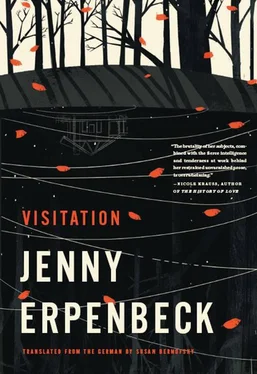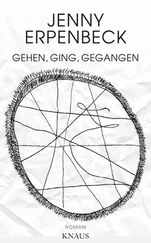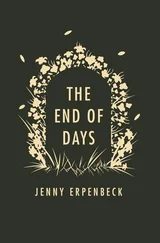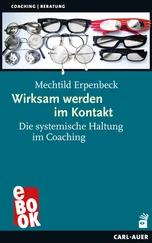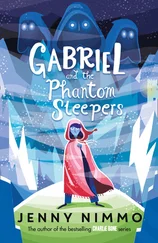Someone who builds something is affixing his life to the earth. Embodying the act of staying put is his profession. Creating an interior. Digging deeper and deeper in a place where there is nothing. From outside, the colored glass in the living room windows he’s now walking past looks dull and impenetrable, the light doesn’t take on life until you’re sitting behind the glass, only then does it become visible as light — when it is being used. Dürer too peered through colored panes of this sort, seeing only the light of the world and not the world itself, he sat indoors creating his own world. If Dürer’s wife wanted to know who was strolling about in the Nuremburg marketplace, she had to open a little flap to look down at the square. The thicker the walls and the smaller the windows, the less warmth was lost by the inhabitants of a house. Fieldstone, straw, plaster: all local materials. In the crotch marking the transition from the gabled to the side-gabled area of the roof was a small shed dormer. The house was to look as if it had just grown here like a living thing. He’d helped brick the chimney himself. He’d always gotten along well with workers and farmers. But not with this state in which one official never knew what the other was doing.
In summer he always took one last swim before leaving. Now, in January, he’s taking a bath too, but not in the lake. Not even his wife would laugh at this lousy joke, though she’s generally quite free with her laughter. When he will have swum here for the last time is something he no longer knows. Nor does he know whether the German language contains a verb form that can manage the trick of declaring the past the future. Maybe at some point in early September. The last time, it wasn’t yet a last time, that’s why he didn’t take note of it. Only yesterday did it become the last time. As if time, even when you grip it firmly in your hands, can still flail and thrash about and twist which way it will. Down in the bathing house his green towel is no doubt still hanging. Perhaps someone else will use it now to dry off. When he acquired the bathing house from the Jews, their towels were still hanging there. Before it could occur to his wife to wash them, he’d gone swimming and rubbed himself dry with one of the strangers’ towels. Strange towels. Cloth manufacturers, these Jews. Terrycloth. Top quality goods. Not too much to ask. His first application to join the Reichskulturkammer was turned down because on the line asking about his Aryan ancestry he had written “yes and no.” In any type of attack, it is essential to assail your opponent from behind. Terrycloth. An official well-disposed toward him, someone he knew from school, had pointed out to him that the race of his great-grandparents was not relevant to this application, and he was then allowed to submit the application a second time, answering the Aryan question with “yes” and attaching the certificates attesting to his and his wife’s ancestry as far back as their grandparents’ generation, whereupon his application was accepted. The yes and the no. The gaps between the planks of the bathing house had been stuff ed with oakum. All the carpentry provisional. Still, he’d paid the Jews a full half of market value for the land. And this was by no means a paltry sum. They’d never have managed to find another buyer in so short a time. Oakum. His father’s mother’s mother. Yes and no. By buying the property, he’d helped the Jews leave the country. No doubt they went to Africa. Or Shanghai. For better or for worse. By buying the property, he’d helped his “no” leave the questionnaire. To Africa or Shanghai, what difference did it make? Just so it was gone, done away with, gone, gone. Yes and no. Keep the sun behind you . Assail the sun from behind, until everything burns up, then put out the fire with the waters of the Märkisches Meer. Yes and no. With any luck the deserts in Africa and the primeval forests of China were large enough that his “no” would starve to death there, die of thirst, be eaten by wild animals. Are you of Aryan descent? Yes. So why is he having to leave now? Baron Münchhausen pulled himself out of the swamp by his own hair. But this swamp was not his homeland. The architect knows far less than he once knew. He’d dried himself off with the Jews’ bath towel and then hung it back on its hook. A white terrycloth towel. Top quality goods. Later he became a member of the Reichskulturkammer. Later he received permission to build a boat shelter beside the dock. His terrycloth towel that is still hanging there is green.
He locks the gate from the outside with the spare key he’s taking with him because you never know. Zeiss Ikon. Quality German workmanship. When he arrived at the crack of dawn, the handle of the gate was wet with dew. The architect now leaves the front garden through the little gate in the fence and steps onto the sandy road outside. If you start walking and then turn around again, you see the house from the front, as if you’d never been inside, you see exactly the same sight that greeted you as you arrived. He puts the key in his trouser pocket and goes over to the car. The gardener must still be asleep. Later in the day, he’ll perhaps saw up the large blue spruce that got blown down the day before yesterday. But by then the owner of this blue spruce, who also owns the dirt clinging to its roots that now lie exposed, will be in West Berlin.
IN THE SPRING he puts in a flowerbed along the side of the house that faces the road, filling it at the householder’s request with poppies, peonies and yellow coneflowers, with a big angel’s trumpet in the middle. For the border, he just pokes a few box twigs into the earth all around the flowers, they’ll put down roots and grow. In summer he sets out sprinklers on both lawns, twice each day they will bow to one side and than the other for half an hour, once early in the morning and once at dusk, meanwhile he waters the flowerbed, roses and shrubs. He cuts off the withered blooms and prunes the box tree. In the fall he harvests walnuts for the first time, coaxing the nuts from their soft husks that stain his hands brown, in the fall he gathers the dry branches that have broken off from the oaks and also a few of the pine trees during storms, he saws them into pieces, chops them up for firewood and stacks the logs in the woodshed.
By 1936, the potato beetle had already crossed the Rhine and was continuing on toward the East, in 1937 it reached the Elbe River, and now, in 1938, it is beleaguering the region around Berlin. With great patience the gardener plucks the beetles over and over from the leaves of the angel’s trumpet, which as the only representative of the nightshade family in the garden has been heavily affected by this plague. He crushes the eggs of these pests and even tries to seek out and destroy their pupae by digging up the earth all around the bush. This summer the sandy road is black with beetles for days on end. At the beginning of the infestation, the leaves of the bush with its splendid red blossoms merely have holes in them and display tattered edges, but by summer’s end all that remains of the bush is its skeleton, a few of the leaves’ ribs and the bare main shoots of the bush itself, the blossoms having long since fallen to the ground. On instructions from the householder, the gardener removes what is left of the angel’s trumpet and plants a cypress in its place as the new centerpiece for the flowerbed.
HERMINE AND ARTHUR, his parents.
He himself, Ludwig, the firstborn.
His sister Elisabeth, married to Ernst.
Their daughter Doris, his niece.
Then his wife Anna.
And now the children: Elliot and baby Elisabeth, named for his sister.
Читать дальше
